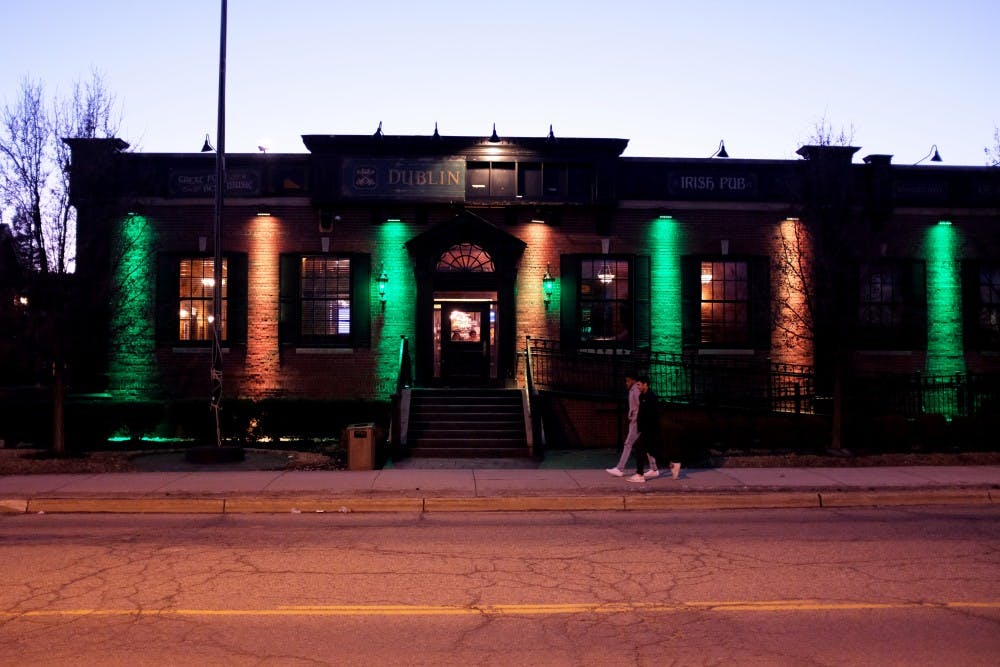Vlahakis Development and Royal Apartments USA first announced the Park Place Project in August 2018 and signed a contract purchasing property from the Downtown Development Authority the following December.
The corner of Abbot Road and East Grand River Avenue has been vacant for over a decade, but with Park District’s construction under full swing, residents, city officials and stakeholders alike are deciding how far the city’s increase in development should go.
Park District includes The Abbot, a mixed-use building and The Graduate Hotel.
A full proposal for Park Place was introduced to the East Lansing Planning Commission in January, with one 12-story building and one 15-story building, including a movie theater and automated parking.
At the time, some city officials were concerned with the height of the buildings and whether or not it complied with the surrounding neighborhood.
How has park place changed?
From condominiums to affordable housing, and from movie theaters to farmers’ markets, the planning commission acted on a much different Park Place proposal in their July 23 meeting.
Park Place West is a 9-story, 110-foot-tall mixed-use building containing two levels of underground parking, with rooftop amenities, a rooftop deck, 184 rental units, 46 low-to-moderate income units and 138 market-rate units. Additionally, the project proposes indoor retail and an outdoor year-round farmer’s market.
The closure of Evergreen Avenue for a pedestrian walkway is consistent with the initial Park Place proposal.
Vlahakis Development President Paul Vlahakis said changes resulted from the inability to acquire additional properties.
“We’ve lost a fair amount of square footage,” Vlahakis said. “The building kind of had to shrink down.”
“We haven’t made those changes lightly,” Royal Properties Vice President of Acquisitions & Development Kelly Kenefick said in a May City Council discussion meeting. “We’re on a tight timeline here just based on the contract.”
Hurdles in the city process
Before the project can be approved, the DDA-purchased properties must be rezoned to allow for the 110-foot building.
“If, for whatever reason, this project does not come to fruition, the DDA has a significant amount of debt on this property,” Community and Economic Development Administrator Tom Fehrenbach said.
Vlahakis said he hopes the process could speed up and allow approval of his project in October, but the last meeting where they could get approval might not be until November.
Fehrenbach said he urged the city to move quickly to maximize the marketing potential for the properties, because rezoning allows for a stronger selection process for projects in the area, if the project falls through.
Support student media!
Please consider donating to The State News and help fund the future of journalism.
Fehrenbach said the DDA’s executive committee made the request.
“I’m fairly certain that the DDA would also be in line with this,” Fehrenbach said. “It’s in the best interest of the DDA to get this in front of council quicker.”
Planning commissioners weren’t ready to signal zoning code changes for the council members.
“If this proposal isn’t acceptable to us or to council, we’re going to see another line of tall buildings, which may or may not cause problems,” Vice Chair Kathleen Boyle said.
Commissioner Chis Wolf agreed. He said it permits another City Center project that the master plan goes against it.
“It sends the completely wrong message,” he said.
The rezoning recommendation failed 5-3 but is still sent to City Council.
“Perhaps a conditional zoning would have been more favorably received,” Commissioner Chair Dan Bollman said.
Issues received in council
The plan proposed to the planning commission involves a lower height than the proposal in the May City Council discussion meeting. Council members were critical of the 14-story height of the first one-building proposal.
Council member Aaron Stephens said he would have preferred a selection process from the start.
“What the DDA did is they entered into a contract with one developer,” Stephens said.
He said that move put pressure on the city to either approve the project or risk losing money from the contract.
“In my view, I think that their timeline they laid out, as well as some of the promises they were making on the project, were fairly outlandish,” he said. “I don’t think it was a good idea for the DDA, I don’t think it was a good idea for the city, I don’t think it was a good idea for the developer at this point.”
The inclusion of a city-operated farmers market also drew some criticism from council members.
“Where’s the money going to come from for us to run this farmers’ market?” Stephens said.
Vlahakis said the funding for the market would be paid for privately. He said its use could spillover for the art festival, or could be used by the People’s Church.
Council members are uncertain about operating a year-round farmers’ market after the Lansing City Market closed last year.
The extent of public reimbursement
Tax Increment Financing, or TIF’s, allow for property tax value increases to be reimbursed to the investors of a given development.
If a developer undertakes one or more of the eligible activities, they can request from the City Council a reimbursement in the property tax value gained over the time of development. This is similar to what developers of a Michigan Avenue Corridor Project did to finance soil restoration and infrastructure improvements.
Vlahakis said all of the eligible activities for Park Place are strictly infrastructure and roads.
When Vlahakis spoke with The State News in July, he said he didn’t have a final number to request from the city.
Vlahakis spoke to infrastructure improvements in the area, such as a new 36-inch storm sewer connecting the neighborhood to a new sewer line under Evergreen Avenue.
Other infrastructure endeavors include extending Albert Avenue through with streets and walkway, and resurfacing the city parking lot.
Another financing mechanism for Park Place could come from the Michigan State Housing Development Authority, or MSHDA.
Kenefick said MSHDA offers two low-income housing tax credit programs, and the agency wants to get them out.
The developers have not backed down. Vlahakis seeks to reach approval for a project that creates a shared interest between Vlahakis Development and the East Lansing community.
Discussion
Share and discuss “After a year of hurdles, Park Place now has competition” on social media.








